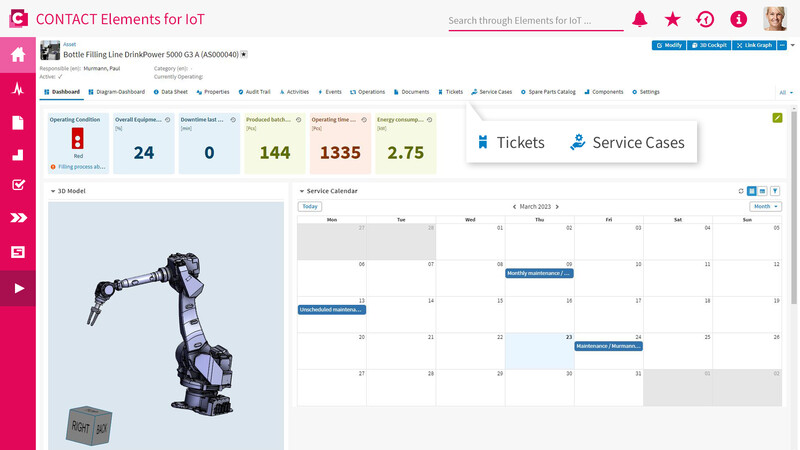Making services smart
Digitalization allows companies to enhance their product offerings with smart services, generate more revenue, and strengthen customer loyalty. In the run-up to the SPS 2023, we spoke with Kilian Bächle about the feasible business models today.
The service business is a significant source of revenue in mechanical and plant engineering, accounting on average for about 20% of sales, according to the VDMA (Association of the German Mechanical and Plant Engineering Industry). In the second part of our interview, Kilian Bächle explains why “smart” digital services increase the profitability of companies and how processes from quotation to invoicing can be successfully automated.
Kilian, in global competition, high-quality services are a crucial distinguishing factor for companies. How can digitalization provide added value in this regard?
In the light of volatile markets, predicting how many new machines a manufacturer will sell is difficult. In contrast, service business generates reliable, recurring revenues and profits. At the same time, service processes in many companies are poorly structured. Digitalization and automation can provide significant added value here. It's no coincidence that the VDMA recommends mechanical and plant engineering to make the service business digitalization a central element for future-proof positioning.
Transparent asset management lays the foundation for smart services. This includes knowing which equipment is located at which customer site, what technical changes have been made over time, which maintenance contracts are in place for the respective product, and when the next on-site inspection is due. Based on this information, the operational service business can then be optimized.
Many companies still have immense untapped potential in this area. Relying on Excel spreadsheets and emails to document service delivery in detail and initiate billing processes burdens service departments with a lot of unnecessary bureaucracy. Errors and dissatisfied customers are almost guaranteed. The process can be sped up by providing digital end-to-end support to service staff, from job preparation to documentation. This is feasible with suitable software.
Can you explain some of these applications in more detail?
Companies using an IoT-enabled platform for asset management can expand their solution with real-time data recording and send selected information from the customer’s asset to the system. With the help of IoT applications, trends in asset performance can be analyzed, and exceptional situations can be responded to swiftly.
Supporting the service starts in job preparation with a list of my upcoming tasks and the necessary materials. This guarantees I’ll never arrive at the customer's site without the correct spare part. Of course, I can also access asset management information on the go and work through my tasks as a checklist. I can quickly and easily record any efforts on the move and even generate reports for the customer on-site.
Is the focus exclusively on optimizing maintenance work?
No. Maintenance, repair, and overhaul are indeed key issues for manufacturers and operators of capital goods with a long lifespan. However, digitalization also enables new data-driven offerings.
For instance, the service provider can offer their end customers access to a self-service platform. In this portal, end customers can view selected information about the products they use, initiate spare parts orders, or submit inquiries to the service provider as a ticket rather than having to pick up the phone.
The smoother and more structured the communication between the service provider and the end customer is, the quicker a customer issue is resolved, the fewer errors occur along the way, and the greater the customer satisfaction is at the end of the day.
Based on such a self-service platform, companies can also implement another expansion stage in their service business: pay-per-use models. In this approach, manufacturers charge for the usage of their products rather than selling them once and optimize their cash flow in the long term. Their customers benefit from lower capital commitment and increased flexibility.
Thank you for the conversation, Kilian!
In part 1 of our interview on the "Smart Factory", you can learn more about achieving the end-to-end digitalization of your company’s production, logistics, and asset management.
Moreover, you will have the chance to experience our open CONTACT Elements for IoT platform live at SPS 2023. If you want to meet Kilian Bächle at SPS or request a custom demo, please schedule an appointment here.
This case study describes how HBC-radiomatic has seamlessly digitalized and significantly accelerated its global customer service.


